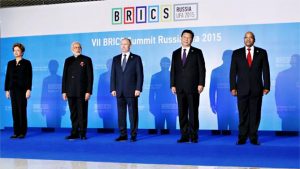BRIC-à-Brac: Requiem for a Wishful Thought
by marten | November 13, 2015 4:07 pm
 In the end, it may have been nothing more than a flash in the pan. Unable to fulfil the promise of a new world order, the BRICS countries have largely ceased to be of note. With sputtering economies and political leaders inclined towards pomp rather than substance, the world’s emerging market powerhouses are being relegated, again, to the margins of global affairs.
In the end, it may have been nothing more than a flash in the pan. Unable to fulfil the promise of a new world order, the BRICS countries have largely ceased to be of note. With sputtering economies and political leaders inclined towards pomp rather than substance, the world’s emerging market powerhouses are being relegated, again, to the margins of global affairs.
China, now and again haunted by the spectre of a domestic financial implosion, offers perhaps a saving grace inasmuch as the country remains a force to reckon with – albeit a slightly less impressive one. Questions are being asked about the country’s economic growth rate. Official figures currently have Chinese GDP expanding at a still remarkable clip of around seven percent annually. However, over the past few months import volumes have contracted by almost twenty percent, casting doubt on the numbers reported by Beijing.
Meanwhile, the economic performance of Brazil, Russia, and South Africa is rather underwhelming. India is registering solid growth – boosted by a few statistical adjustments – and is led by a pro-business no-nonsense government that may yet unlock the country’s vast, but chronically underused, potential.
“Unable to fulfil the promise of a new world order, the BRICS countries have largely ceased to be of note.”
Investment bank Goldman Sachs, until recently almost recklessly bullish on the BRICS prospects and indeed the bank that originally coined the acronym, earlier this month announced the folding of its Bric Fund after it repeatedly missed all applicable benchmarks and suffered from chronic underperformance. The fund’s assets under management had dwindled to a paltry $100m which will now be folded into a generic emerging markets fund.
Over the past decade, the MSCI BRIC Index lagged only slightly behind the 6.4% annualised return offered by the World Index. It has, however, been outperformed by the broader global MSCI Emerging Markets Index. While pioneer and emerging markets barrelled ahead, the BRIC(S) countries saw investors depart in droves. Albert Edwards, a famously grumpy strategist at French Société Générale, may feel vindicated. Mr Edwards was one of the first to identify the high expectations surrounding the group as a pie-in-the-sky. He promptly rebranded it as Bloody Ridiculous Investment Concept.
The Washington-based Center for Strategic and International Studies (CSIS) recently published a paper in which its experts and analysts conclude that the BRICS countries much-touted attempts to forge a new geopolitical reality remains an exercise in rhetoric. Grandstanding may impress domestic audiences; it does not create or change global realities.
Six summit meetings in, the collective has yet to produce a set of policy objectives or a strategic agenda. Apart from a half-hearted attempt at setting up a development bank – complete with a vintage-style website and brilliantly named New Development Bank – no institutional apparatus has been formed. For all their diplomatic posturing, the BRICS countries have not been overly successful in defining, let alone pursuing, common foreign policy objectives. True, there have been a number of magnificent photo-ops.
CSIS researcher Marcos Degaut did not mince words in his conclusion: “Not many concepts have done more to muddle strategic and academic thinking about the global economy and international politics in the last decade than that of the BRICS.”
Home to about 42% of the world population, the BRICS countries were supposed to pick up the slack when the global economy plunged into recession after the 2008/9 financial crisis. That hope was short-lived as the economies of Russia, Brazil, South Africa, and India nosedived in succession. Since then, India has recovered reasonably well, while China is doing it level best to stave off a full-blown banking crisis.
If there is a lesson in here, it could be that command on the world stage does not come from acronym-inspired summits or the peddling of good intentions. Countries that aspire to greatness would be well advised to get their house in order first – raising living standards, abiding by the rule of law, fostering competition, and implementing sustainable policies aimed at wealth creation. Without exception, each one of the BRICS nations sought for a shortcut in one form or another, and all failed.
As developing nations attempt to adjust to the end of the resources boom – with lower demand from China creating global glut that severely depresses prices – good governance will mark the boundary between national success and failure.
On which side of the line Brazil and Russia will fall seems abundantly obvious. The former is saddled with a government despised domestically while the latter with one reviled internationally. The Zuma Administration of South Africa does try to put on a good show but falls woefully short on delivering the goods. A government that cannot even manage to keep the lights on need not really bother with the pursuit of more ambitious development goals.
Out of India come all the right noises: it is a nation set for take-off, if only someone would dare press the launch button. China never needed the other BRICS to begin with. In fact, some have argued that the whole idea was merely an exercise of the other four to gain access to China’s deep pockets.
Thus, the world will not shed a tear over the demise of the BRICS – the block that never was. With the Trans-Pacific Partnership almost ready to be deployed, the Pacific Alliance quietly unifying the four most successful economies of Latin America, and Europe back on track thanks to massive quantitative easing; who needs the BRICS anyway?
Source URL: https://cfi.co/africa/2015/11/bric-a-brac-requiem-for-a-wishful-thought/